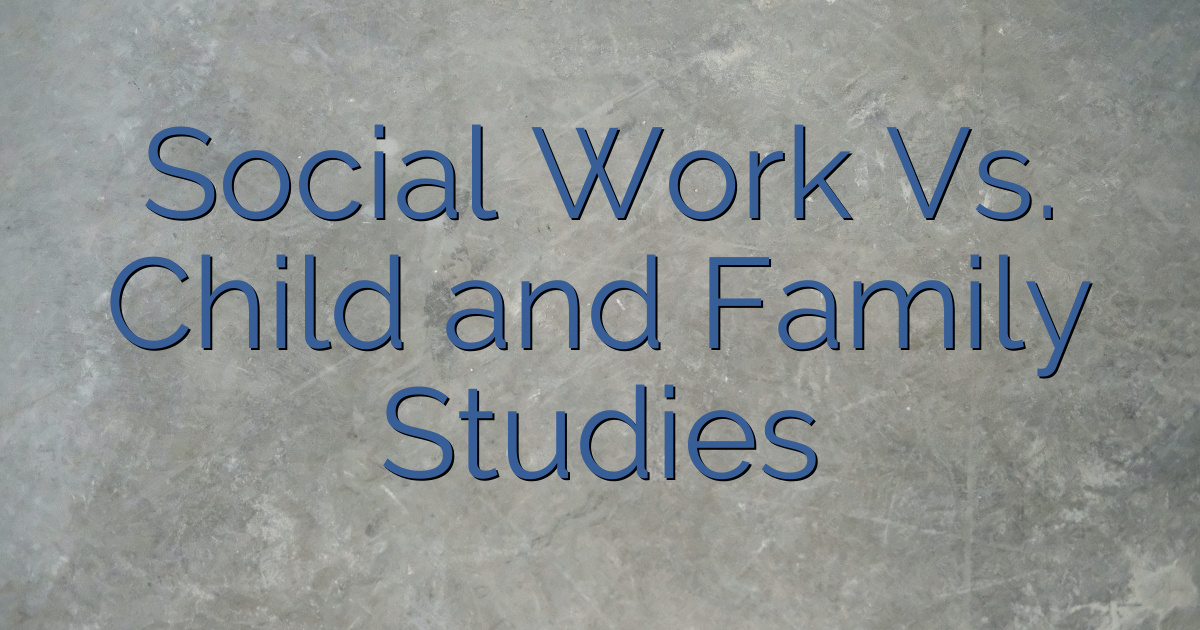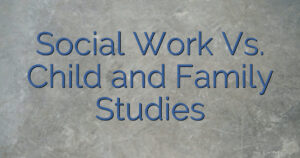 Are you torn between pursuing a degree in Social Work or Child and Family Studies? It’s not an easy decision, but luckily, we’re here to help you find the answers you need.
In this article, we’ll explore the similarities and differences between these two majors, provide an overview of their curriculum and requirements, and discuss the skills developed and career opportunities available in each field.
By the end, you’ll have the knowledge and insight to make an informed decision about your future.
So, let’s dive in and discover which path is right for you.
Are you torn between pursuing a degree in Social Work or Child and Family Studies? It’s not an easy decision, but luckily, we’re here to help you find the answers you need.
In this article, we’ll explore the similarities and differences between these two majors, provide an overview of their curriculum and requirements, and discuss the skills developed and career opportunities available in each field.
By the end, you’ll have the knowledge and insight to make an informed decision about your future.
So, let’s dive in and discover which path is right for you.
Table of Contents
Key Takeaways – Social Work Vs. Child and Family Studies
- Social work focuses on assisting individuals, families, and communities in need, while child and family studies concentrates on the development, well-being, and dynamics of children and families.
- Both majors require a deep understanding of ethical considerations, with social work emphasizing confidentiality, cultural sensitivity, and client autonomy, and child and family studies professionals facing ethical dilemmas in ensuring the safety and well-being of children while respecting the rights and wishes of their families.
- Child and family studies focuses on child development, family dynamics, and providing support and resources to families, while social work places a strong emphasis on advocacy, policy, and addressing societal issues.
- Nonprofit organizations offer career opportunities in community outreach, case management, counseling, and advocacy for social work professionals, while child and family studies professionals can work in child welfare, family support, and early childhood education roles in nonprofits. Both fields allow professionals to make a positive impact on individuals and communities in need.
Overview of the two majors: Social Work and Child and Family Studies
Social work and child and family studies are two majors that provide an overview of the field of social services. When it comes to the scope of practice, social work focuses on assisting individuals, families, and communities in need. This includes addressing issues such as mental health, poverty, and substance abuse. Child and family studies, on the other hand, concentrates on the development, well-being, and dynamics of children and families. Both majors require a deep understanding of ethical considerations. Social workers must adhere to a strict code of ethics that emphasizes confidentiality, cultural sensitivity, and the importance of client autonomy. Child and family studies professionals also face ethical dilemmas, such as ensuring the safety and well-being of children while respecting the rights and wishes of their families. By studying these majors, you will gain the knowledge and skills necessary to make a positive difference in the lives of vulnerable individuals and families.Overview of the curriculum and requirements of the two majors
The curriculum and requirements for the two majors in child and family studies and social work are quite distinct. While both fields involve working with individuals and families, they have different focuses and career paths. In child and family studies, the emphasis is on understanding child development, family dynamics, and providing support and resources to families. On the other hand, social work places a strong emphasis on advocacy, policy, and addressing societal issues that affect individuals and families. A comparison of fieldwork experiences in these two majors further highlights the differences. In child and family studies, students may engage in direct interventions with families, while social work students often work in community organizations, government agencies, or policy advocacy groups. Understanding these distinctions can help you make an informed decision about which major aligns with your career goals and interests.| Child and Family Studies | Social Work |
|---|---|
| Focus on child development and family dynamics | Focus on advocacy and policy |
| Direct interventions with families | Work in community organizations, government agencies, or policy advocacy groups |
| Provides support and resources to families | Addresses societal issues affecting individuals and families |
Overview of coursework, assessments, and field placements
Students in the child and family studies major engage in coursework, assessments, and field placements that provide hands-on experience working with individuals and families. The coursework content is designed to give you a comprehensive understanding of the diverse needs and challenges faced by individuals and families in today’s society. You will learn about child development, parenting strategies, family dynamics, and community resources. Through assessments, you will gain the skills to analyze and evaluate the strengths and needs of individuals and families, allowing you to provide effective support and intervention. Field placement requirements further enhance your learning by giving you the opportunity to apply your knowledge in real-world settings. This hands-on experience is invaluable as it allows you to develop your skills, build professional relationships, and make a positive impact on the lives of individuals and families.Skills Developed in Social Work Vs. Child and Family Studies
In both social work and child and family studies, the coursework and field placements play a crucial role in developing the necessary skills for working with individuals and families. These skills are vital for helping people navigate through challenging situations and improving their overall well-being. Skills developed in social work and child and family studies include:- Effective Communication: Learning how to actively listen and communicate empathetically with individuals and families to understand their needs and concerns.
- Problem-Solving: Developing the ability to analyze complex situations, identify underlying issues, and find practical solutions.
- Advocacy: Gaining knowledge and skills to advocate for the rights and well-being of individuals and families, ensuring they have access to the necessary resources and support.
Comparison of Career Opportunities and Job Roles in Social Work Vs. Child and Family Studies – Nonprofit
Nonprofit organizations offer a variety of career opportunities for professionals in both social work and child and family studies. If you are considering a career in these fields, it’s important to understand the different career paths and job prospects available. In social work, nonprofit organizations often hire professionals to work in areas such as community outreach, case management, counseling, and advocacy. These roles allow you to make a positive impact on individuals and communities in need. Similarly, in child and family studies, nonprofits offer positions focused on child welfare, family support, and early childhood education. By working in these organizations, you can contribute to the well-being and development of children and families.Comparison of Salary Potential – Job Market Trends
Now that you have a better understanding of the career opportunities and job roles in social work and child and family studies in the nonprofit sector, let’s delve into an important aspect of any career decision – salary potential. It’s crucial to consider the job market trends and potential earnings when choosing a path that aligns with your passion and financial goals. Here are some key points to keep in mind:- Job Market Trends:
- Social work is experiencing steady growth, with an increasing demand for professionals who can address complex social issues.
- Child and family studies also show promising growth, particularly in areas such as child welfare and family support services.
- Both fields offer stable employment prospects, as the need for support in these areas continues to rise.
- Salary Potential:
- Social work salaries vary depending on factors such as education, experience, and geographic location. However, professionals in this field can expect a median annual wage of around $50,000.
- Child and family studies professionals can also have a rewarding earning potential, with salaries ranging from $40,000 to $60,000, depending on the specific role and qualifications.
Similarities in curriculum between the two majors
When considering your academic path, you’ll notice that the curriculum for both majors in question has some striking similarities. Both social work and child and family studies focus on understanding and addressing the needs of individuals, families, and communities. While there are differences in field placements and internship requirements, the core courses provide a solid foundation in human development, social justice, and research methods. To help you visualize the similarities between the two majors, here is a table comparing their respective curriculum:| Social Work | Child and Family Studies |
|---|---|
| Social Welfare Policies | Family Dynamics |
| Case Management | Child Development |
| Counseling Techniques | Parenting Skills |
Difference between Social Work and Child and Family Studies – Populations
While they both focus on understanding and addressing the needs of different groups, social work primarily deals with individuals and communities, whereas child and family studies primarily focuses on the dynamics within families and child development. In social work, you develop a range of skills such as counseling, case management, and advocacy, which enable you to support individuals and communities facing various challenges. On the other hand, child and family studies equip you with knowledge in child development, family dynamics, and parenting strategies, allowing you to work directly with families to promote healthy relationships and child well-being. When it comes to career opportunities, social work offers a broader range of options. You can work in hospitals, schools, government agencies, or non-profit organizations, providing support and resources to individuals and communities. In child and family studies, you can pursue careers as family therapists, child life specialists, or early childhood educators, focusing on the well-being of children and families.Factors to consider when choosing between the two majors – Prospects
If you’re considering choosing between the two majors, it’s important to take into account the future prospects and career opportunities each field offers. Both social work and child and family studies have promising career paths, but it’s essential to understand the job market demand for each. In today’s world, the demand for social workers is high due to the increasing need for professionals who can support individuals and communities facing various challenges. Social workers play a crucial role in advocating for vulnerable populations and promoting social justice. On the other hand, child and family studies also offer rewarding career opportunities, particularly in areas such as child welfare, early childhood education, and family support services.What Are the Key Differences Between Social Work and Child and Family Studies?
When comparing social work versus nonprofit management, it’s important to note that social work focuses on supporting individuals and communities, while child and family studies center on understanding family dynamics and child development. Nonprofit management involves overseeing organizations that serve societal needs, while social work addresses individual well-being.

